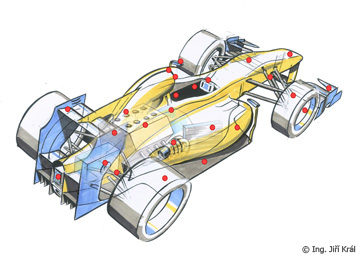Brembo unveils use of its braking systems at the 2018 Formula 1 Chinese GP
Alessandra Fedeli/ Brembo | 10.4.18 | Brembo F1 brzdy
Brembo F1 2018
Brembo unveils use of its braking systems at the 2018 Formula 1 Chinese GP
Everything you want to know about the braking sections that demand the most from drivers, dissipated energy and time spent braking
From April 13 to 15, the Shanghai International Circuit will host the 3rd race of the 2018 Formula 1 World Championship. The track was designed by architects Hermann Tilke and Peter Wahl on swampland, which is why 40,000 stone pillars were positioned underneath before construction started, creating a stable foundation.
In the 2017 Chinese GP, a good 54 overtakings were registered. Contributing to this feat were two straightaways on the track, one at the finish line measuring over 764 meters and another about 1.202 meters long, which allow drivers to make use of the DRS. The track also has five second-gear corners that can be taken well only if the car has a significant aerodynamic load.
The circuit as a whole is not particularly demanding on the brakes, especially because the cars are usually at maximum aerodynamic load. According to Brembo technicians, who classified the 21 tracks in the World Championship on a scale of 1 to 10, the Shanghai International Circuit falls into the category of circuits that present mid-level difficulty for brakes. The Chinese track earned a 6 on the difficulty index, identical to the score given to the Austin circuit.
Each team that uses Brembo products is supplied with a tailor-made braking system, which is tightly integrated with the car design and subject to continuous refinement throughout the season.
This is another reason why the brake calipers were completely redesigned for each of the supplied teams. The idea is to integrate it with the aerodynamic solutions researched by each team, working towards maintaining optimal lightweightness and stiffness, in spite of the larger-sized disc.
The demand on the brakes during the GP
Even though this track is longer than the one in Melbourne by just a few hundred meter, the Shanghai International Circuit requires drivers to turn to the brakes more often, using them for almost 18 seconds per lap. This translates into a lap time that is a good 10 seconds more than the time registered on the Australian track.
With respect to 2017, the average deceleration has increased, going from 3.5 G last year to 3.7 G this year. This value is very high in absolute terms, yet it is lower than what was recorded at a lot of the other World Championship tracks.
From the starting line to the checkered flag, each driver uses his brakes nearly 450 times, applying a total load on the brake pedal of more than 38 tons, which is equivalent to the weight of 440 female adult pandas. Said another way, each driver applies a load of more than 390 kg per minute.
As for energy dissipated in braking, the Shanghai International Circuit places last among the World Championship tracks: over the course of the entire race, a car dissipates in braking about 101 kWh of energy on average, the same amount of electric energy consumed daily by approximately 8 Shanghai residents.
The most demanding braking sections
Of the 8 braking sections at the Shanghai International Circuit, 3 are classified as demanding on the brakes, 1 are of medium difficulty and 4 are light.
The most challenging braking section is curve 14 with its 5 G in deceleration: the single-seaters arrive at the curve going more than 327 kmh and they brake to go down to 69 kmh in just over 114 meters. At this point, the drivers apply a load of 115 kg on the brake pedal.
Turn 6 is also exciting: speeds go from 292 kmh to 85 kmh in about 101 meters, while the deceleration reaches 4.9 G. This is the same amount of braking space found at curve 11, but the deceleration there is slightly lower (4.8 G) and the load on the pedal is greater (115 kg instead of 113 kg).
The first curve is unique in that it comes after the finish line and the cars are going more than 322 kmh because the turn-in stage lasts a long time, extending all the way to turn 2, which is practically attached to the first one. In other words, the pilots never take their foot off the brake pedal, if not for a mere fraction of a second. Which explains the 5,21 seconds spent overall in braking.
Brembo Performance
In China, the single-seaters equipped with Brembo calipers have won 10 of the 14 races contested up to today, including the last six. This is also where Sebastian Vettel won his first race with Red Bull in 2009.




